
14 Aug How to Maintain Smooth Skin After Laser Hair Removal
Laser hair removal can provide long-lasting and smooth skin. Your skin may need time to recover after the laser targets hair follicles with concentrated light energy. An aftercare routine helps protect your skin, minimizes side effects, and enables you to achieve the best results from each treatment. Here are a few ways to take care of your skin between visits to maintain the best results from your laser hair removal:
Care Steps After Your Session
Apply a cold compress or ice to treated areas for short intervals to calm the skin and support comfort after laser hair removal. The laser targets hair follicles effectively, and the skin may feel sensitive immediately afterward. You can return to your normal daily activities after your treatment, allowing your routine to continue uninterrupted.
Protecting your skin from sun exposure is recommended after the treatment. Apply broad-spectrum sunscreen to treated areas whenever they may be exposed to the sun. This step can help maintain smooth results and minimize the risk of irritation or discoloration.
Keeping Skin Calm and Hydrated Long-Term
Hydration supports the skin during the hair removal process. Applying a gentle, fragrance-free moisturizer to treated areas twice daily helps maintain the skin barrier and reduce irritation. Ingredients such as aloe vera, hyaluronic acid, and ceramides can further support healing and comfort between sessions.
Sun protection plays a key role in long-term care. Laser-treated skin becomes more sensitive to UV exposure; daily use of broad-spectrum SPF 30 or higher is recommended. Other measures to protect the skin include:
- Reapplying sunscreen every two hours when outdoors
- Wearing protective clothing, such as long sleeves or hats
- Limiting direct sun exposure during peak hours
A gentle skincare routine helps the skin recover without causing additional irritation. Mild, soap-free cleansers are preferred, while products containing retinoids, alpha hydroxy acids, or benzoyl peroxide should be avoided on treated areas. Simple, consistent care supports healing and helps maintain smooth, healthy skin throughout the treatment series.
Choosing Products That Won’t Irritate
Choosing the right skincare products supports healing after laser hair removal. Alcohol-based toners, harsh scrubs, and products with fragrances or dyes can cause irritation, while formulations designed for sensitive skin reduce the risk of inflammation. Natural ingredients such as aloe vera, coconut oil, and oatmeal provide soothing, moisturizing, and anti-inflammatory benefits. Professional-grade products are often recommended for post-laser care, and technicians can provide guidance on which formulations work best for treated skin.
Ways to Avoid Ingrown Hairs Post-Treatment
Gentle exfoliation may be useful 3–5 days after treatment, once initial sensitivity has eased. Using a soft washcloth or a gentle scrub helps remove dead skin cells that might trap emerging hairs, reducing the risk of ingrown hairs and keeping the skin smooth. This step also supports overall skin clarity between laser hair removal sessions.
Clothing choices can influence skin comfort and hair growth after treatment. Loose, breathable fabrics reduce friction against treated areas, while tighter clothing may push hairs back under the surface. Observing for small bumps, redness, or trapped hairs allows for early management, and technicians can provide guidance if ingrown hairs appear.
Knowing When to Book Your Next Laser Hair Removal Appointment
Hair grows in cycles, and treatment is often most effective during the active growth phase. Treatments usually occur every 4–8 weeks, depending on the area and individual hair patterns. Some hairs may shed 1–3 weeks after a session, indicating that the laser is targeting follicles effectively. New growth typically appears 4–6 weeks later, which can guide when the next appointment might be scheduled. Maintaining this schedule supports consistent results and helps the skin stay smooth and hair-free over time.

No Comments